Urban Development
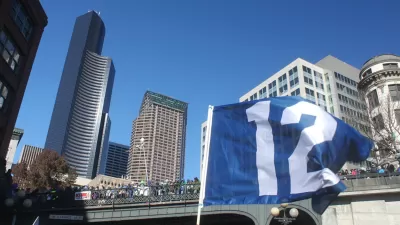
Placemaking Lessons Learned from Seattle's Super Bowl Parade
Last Wednesday, an estimated 700,000—more than the city's population of 635,000—welcomed the Seahawks home, without major incident. Writing in The Atlantic Cities, Chuck Wolfe describes five lessons for placemaking through words and photographs.

Arizona’s Suburb of the Future
Atlantic Cities details the new urbanist vision of a master planned community called Eastmark in Mesa, Arizona. The development’s mix of uses, form-based code, and walkability create “an uncommon sales pitch for car-dependent Arizona.”
Recapping the Tenure of D.C. Planning Director Harriet Tregoning
Harriet Tregoning recently announced the end of her seven-year tenure as planning director of Washington D.C. Called by some the “futurist-in-chief,” Tregoning will head to HUD, where she’ll head the Office of Sustainable Housing and Communities.
Miami Dig ‘One of the Earliest Urban Plans in Eastern North America’
Plans to build “movie theaters, restaurants and a 34-story hotel” overlap with the archaeological site of a 2,000-year-old Tequesta village.
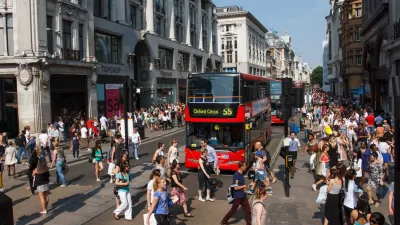
What Is 'Walkability,' Really?
Walkable developments are in demand, but what really makes a community "walkable"? It all boils down to three simple principles—physical access, proximity, and places—says John Lavey.
Train Stations Plan for the Future
In many places across the country, rail is breaking ridership records as we move away from the personal car. How does a rail hub manage the influx of passengers while being a good neighbor?
Ballot Box Zoning Initiative Possible for San Francisco
Proponents of a ballot initiative that would require a vote for any development on the San Francisco waterfront that exceeds existing height limits have gathered enough signatures to put the issue to a vote.
Why the U.S. is Auto-Dependent (and Europe isn't)
In the early part of the 20th century, Europe looked toward the U.S. to learn how to adapt cities to car travel, as difficult as that may seem. It wasn't until the 1990s, in the presence of sprawl and failing public transit that the pattern reversed.
Public Benefits Not Worth Density to Palo Alto Residents
Palo Alto’s planned community zoning has existed since 1951. As the real estate market in the Silicon Valley heats up, residents are questioning whether developers are abusing the density and height benefits they receive from the zoning code.
Ped-Friendly Proposal for Houston’s Downtown Convention Center
In anticipation of the 2017 Super Bowl, Houston First Corp. is seeking approval of a project to improve the city's convention center and “reshape the once-moribund East End of downtown into a dynamic new focal point of the city.”
Wrestling with the ‘D’ Word (Density)
There are few hot buttons in planning conversation like the word “density.” One writer in San Diego claims that the breakdown inspired by the term originates from concerns with cars, not buildings.
Behind the Scenes of Philly's New Land Bank Law
In Philadelphia, an alliance of unusual suspects worked together to convince the city to create the land bank. The law isn't perfect but the new land bank will significantly improve the city’s vacant property process.
The Mythical Search for 'Congruity' in the City
In the eighth installment of the Urban Juxtapositions series profiled in Planetizen on January 16, Chuck Wolfe asks if we are using the right language when it comes to densifying urban spaces.
What Can Ancient Cities Teach Modern Urbanites?
These 15 ancient cities can help modern urbanites plan more efficient and sustainable municipalities.
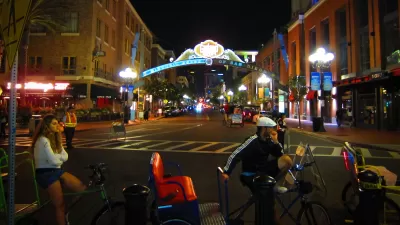
What Makes San Diego Walkers Stop So Much?
San Diego's downtown street grid features smaller blocks than almost all other major U.S. cities. Small blocks mean more intersections, less distance between them, and a lot of interrupted bipedaling. Bill Adams reviews some potential fixes.
Developing the Recipe for a Thriving Corridor in St. Louis
Along an eight-mile corridor that runs westward from the Gateway Arch, the population has jumped 10 percent since 2000. Tim Bryant examines the ingredients that define the place "where St. Louis succeeds as a city."
"Ghost Buildings" Help Stakeholders See the Shape of Things to Come
An Oxford city councillor would like to bring a Swiss system of erecting "ghost building" profiles to the UK for the first time to help residents and officials understand the scale of proposed projects before granting permits.

Professionals Priced Out of Hot Detroit Neighborhoods
As unbelievable as it may sound in a city with tens of thousands of vacant properties, young professionals are being priced out of popular Detroit neighborhoods like Midtown and Corktown as demand far exceeds supply.
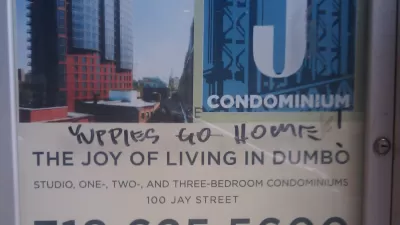
Gentrification and Displacement: Not the Relationship You Might Have Thought
The prevailing wisdom is that as a neighborhood gentrifies, long-time, low income residents are forced to move out because of rising rents, i.e. displacement. Two studies from Columbia University and the Federal Reserve draw different conclusions.
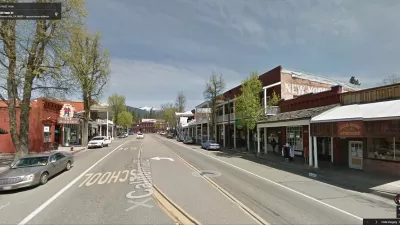
StreetSeen: A New Tool for Understanding the Built Environment
Want an easy to use public engagement tool that helps you to understand the visual preferences of the public? StreetSeen (http://streetseen.osu.edu), a free online tool allows planners and others to simply construct and deploy visual surveys.
Pagination
Urban Design for Planners 1: Software Tools
This six-course series explores essential urban design concepts using open source software and equips planners with the tools they need to participate fully in the urban design process.
Planning for Universal Design
Learn the tools for implementing Universal Design in planning regulations.
Heyer Gruel & Associates PA
JM Goldson LLC
Custer County Colorado
City of Camden Redevelopment Agency
City of Astoria
Transportation Research & Education Center (TREC) at Portland State University
Camden Redevelopment Agency
City of Claremont
Municipality of Princeton (NJ)


































